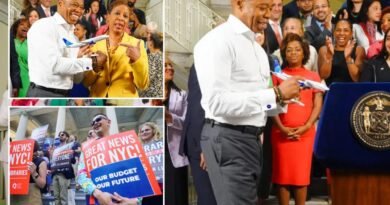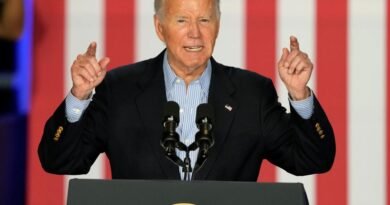Columbia’s Anti-Israel Protesters Boldly Sue the University

A group of protesters at Columbia is attempting to shift blame onto the university after violating established guidelines during their demonstrations.
Last week, three students initiated a lawsuit against the school, claiming that Columbia took excessive measures to suppress protests following the Gaza Solidarity Encampment, which sparked widespread activism last spring.
Catherine Curran-Groome, Aidan Parisi, and Brandon Murphy are lamenting their suspensions and arrests during the protests, despite knowingly flouting school policies and breaking the law.
They seem to lack an understanding that rules exist for a reason.
“These students are learning the hard way that their actions have consequences,” stated Columbia alumni association president Ari Schrage in an interview. “If they truly believed in their cause, why are they resorting to legal action?”
The trio is claiming unspecified damages, asserting that Columbia “departed from its established rules and policies to unlawfully target and punish plaintiffs… to silence and effectively expel them.”
However, their argument appears fundamentally flawed.
While these students may perceive themselves as champions of their cause, their disciplinary actions were not a result of their political beliefs. If that were the case, I would advocate for their right to free speech—even though I disagree with their views.
They were not singled out because of their pro-Palestinian stance; they set up camp in the quad and protested when asked to disperse by the administration.
The actions leading to their suspensions were the result of engaging in disruptive and unlawful protests that clearly broke university regulations. Columbia’s outdoor space policy has been in place since the 1980s when students previously protested against apartheid in South Africa.
A quick review of the student handbook clarifies that last spring’s protesters were indeed in violation of school rules: “All tenting must be ordered through Columbia Facilities Events Administration.”
This is not a case of viewpoint discrimination. Had pro-Israel students chosen to set up their own encampment in the quad, they too would have been removed.
No student has the privilege to disrupt campus life and occupy university property unlawfully.
The Columbia administration acted appropriately by involving the NYPD to clear the encampment when students consistently ignored multiple requests to vacate the area.
Murphy and Parisi were arrested when the initial encampment was dispersed in April.
I witnessed the NYPD giving participants ample chances to leave voluntarily before taking actions to arrest those who defied orders.
Protesters may try to rewrite the narrative, but what occurred was not an oppressive crackdown. It was the standard enforcement of private property laws, during which students reacted with emotional outbursts, chanting, “NYPD, KKK, IDF, you’re all the same.”
The plaintiffs, who are graduate students, complain in their lawsuit about receiving one- and two-year suspensions, despite being set to graduate this May.
“It’s ironic that those involved in this protest movement would accuse the institution of impeding their graduation when their actions over the past year and a half hindered others from engaging with their education fully and safely,” remarked Lishi Baker, a junior at Columbia, during an interview.
He raises a valid point. What about the other students who faced disruptions and were forced to attend classes online while enduring the chants from the quad?
The audacity of these students to file a lawsuit reveals a significant flaw within the pro-Palestine student encampment movement.
They sought to act as freedom fighters while evading the repercussions of their civil disobedience.
“It has become increasingly apparent in my experience that many students struggle to differentiate between protected speech, which should not lead to punishment, and civil disobedience,” commented Greg Lukianoff, president of the campus free speech organization FIRE.
When Martin Luther King, Jr. bravely participated in sit-ins at lunch counters, he anticipated the likelihood of arrest to convey his anti-segregation message.
In contrast, Columbia students believed they could protest, break rules, and still escape unscathed as they approached graduation.
They craved the ideals of civil disobedience while also wanting to avoid its consequences.
True dignity lies in accepting consequences with your head held high for the sake of your beliefs, while indignity exists in resorting to legal action in response to those consequences.



